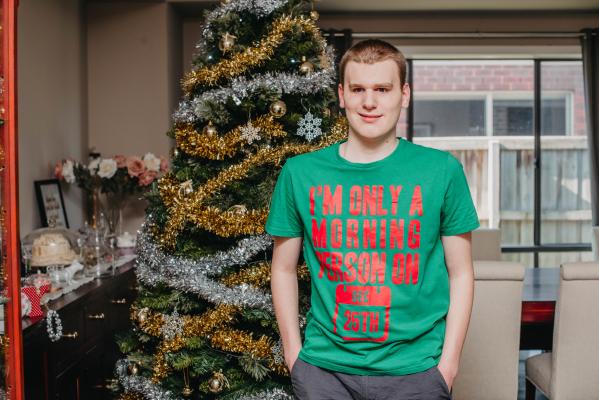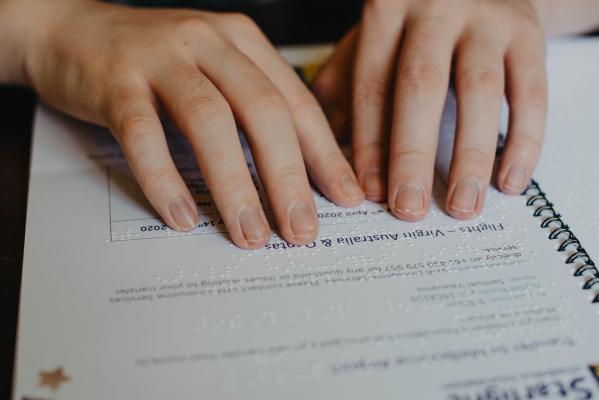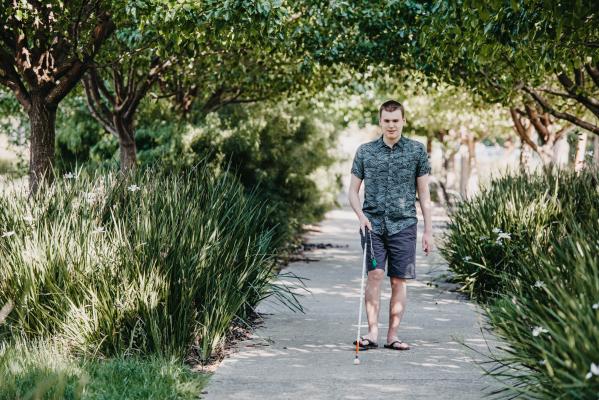
By Jessica Anstice
Vision Australia’s Carols by Candlelight is a very important fundraiser for children who are blind or have low vision like Berwick local Sam Valavanis who lost sight in both eyes when he was four after being diagnosed with a rare cancer.
The courageous 18-year-old was born with a rare eye condition called Retinoblastoma.
“Most children with this cancer will receive their diagnosis before the age of five. In my case, I was diagnosed with bilateral Retinoblastoma, meaning I had it in both eyes,” he said.
“After four-and-a-half years of aggressive treatment involving chemotherapy, cryotherapy and laser therapy, doctors were left with no other option but to remove both my eyes, in order to prevent the cancer from taking my life.
“As such, I have been totally blind for over thirteen years.”
The month before Sam was due to have his second eye removed, his parents Lisa and Jim Valavanis, organised a fundraiser event in order to raise money for they Beyond Sight Auxiliary Foundation at the Royal Children’s Hospital, where Sam was receiving treatment.
The aim was to raise much-needed funds for screening technology to assist in early diagnosis of Retinoblastoma in children, which was greatly lacking at the time.
“However, my parents also wanted it to be a celebration and farewell of sorts to my sight,” he recalled.
“It was held outdoors at the local primary school in the suburb where we lived at the time, with motorcycle rides, a raffle, a silent auction and more.
“We also held another fundraiser three years later at the primary school of our current suburb, with similar events and attractions but unfortunately that day, the weather was not very welcoming, with cold rain and harsh winds, in contrast to the clear blue skies of the previous fundraiser.”
To help move about, Sam uses a technique called ‘echolocation’, which helps him detect surrounding objects by sensing echoes.
Echolocation is when someone repeatedly makes short, sharp noises, usually tongue-clicks or handclaps, in order to develop a sense of the area of certain spaces, usually large or open ones.
“It is also what animals like bats and dolphins use to hunt and move about at night,” he explained.
“I often use echolocation when navigating the community, especially in unknown or unfamiliar territory.”
When it comes to reading, his preference is audiobooks over braille, as he takes a lot more in aurally than by reading.
“Narrators of audiobooks are able to give the story and characters meaning to their voices, rather than just the same appearance and tone of braille,” he said.
“And lastly, because my fingers often get tired quickly after I start reading, and I find it more relaxing to listen to an audiobook than to read one in braille.
“But that’s not to say I don’t occasionally like to read a good braille book as well.”
Sam was able to share his medical journey with family by his side through an audiobook that has since been published.
His favourite narrator, Stig Wemyss, collaborated with Sam’s family to narrate a book about their time going through treatment and how it has affected them since.
“Stig narrated the majority of the book, but my Mum, Dad and I each narrated a chapter, with me narrating the chapter that I wrote from my perspective about my life,” he said.
“It was an amazing process to go into the recording booth to narrate my own words for a book I hoped would help a lot of people.”
Vision Australia has always held a place in Sam and his family’s hearts and in return, he has been selected once again as an ambassador for the organisation’s biggest event of the year.
“Vision Australia has always been there to support us through every hurdle, ever since day one,” he said.
“Since my Mum rang them in tears the day after she found out I was going to be blind, they have offered just about every service imaginable in order to provide me with the best opportunities in my young life.
“From early childhood development to orientation and mobility instructors and beyond, they have always been there for my family and I when we’ve needed them most.”
With the coronavirus pandemic restrictions in place, the iconic Carols by Candlelight event will look a little different this year.
While Vision Australia’s biggest fundraiser of the year is still set to go ahead, there will be no audience.
“Vision Australia has provided me with many resources and necessary skills to assist me with day to day life for someone living with a vision impairment,” he added.
“Some of these include an education in basic braille skills, orientation and mobility and occupational therapy training and development, and assistive technology such as a Perkins Brailler and DAISY player.”
Having already been an ambassador for Carols by Candlelight in 2015 where he gave a speech about how Vision Australia helped his family, Sam is excited to take part again this year.
“I am super excited to be an ambassador at this year’s carols. I can’t wait to be involved again and see how different it will be five years later.
“I understand that this year’s carols will be very different due to the effects of coronavirus, but I hope that the audience at home will still see the impact that Vision Australia has on people and families like mine who have been through a lot of tough times.
“Their support to help blind and vision impaired children and adults achieve their goals and live a fulfilling life is invaluable.”
Sam believes it is important people are educated on what it’s like to live with a disability.
“I definitely believe it is important to provide everyone with a good understanding of what it is like to live with any disability, regardless of whether it is to do with blindness or low vision,” he said.
“If everyone is able to understand how these people live, this will create fairer opportunities and decrease bias towards those impacted by disabilities.”








